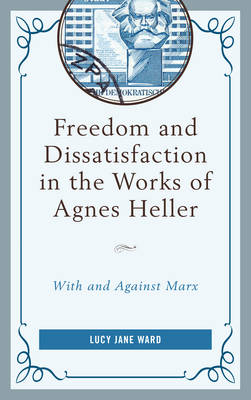
Freedom and Dissatisfaction in the Works of Agnes Heller
With and against Marx
Seiten
2016
Lexington Books (Verlag)
978-0-7391-8976-4 (ISBN)
Lexington Books (Verlag)
978-0-7391-8976-4 (ISBN)
In this book, Lucy Jane Ward argues that although contemporary scholarship tends to divide Agnes Heller's work chronologically in terms of her “Marxist” and subsequent “post-Marxist” periods, a closer reading reveals her work as a continuing engagement both with and against Marx's idea of the human being rich in need.
Ward’s book focuses on the work of the Hungarian philosopher Agnes Heller; prominent member of the Budapest School, a group of students who studied under the Marxist social theorist György Lukács. For both Marx and Heller (albeit in different ways) dissatisfaction emerges as the inevitable result of the expansion of need(s) within modernity and as a catalyst for the development of anthropological wealth (what Marx refers to as the 'human being rich in need'). Ward argues that dissatisfaction and the corresponding category of human wealth–as both motif and method–is central to grasping Heller’s seemingly disparate writings. While Marx postulates a radical overcoming of dissatisfaction, Heller argues dissatisfaction is integral not only to the on-going survival of modernity but also to the dynamics of both freedom and individual life. In this way Heller’s work remains committed to a position that both continually returns and departs, is both with and against, the philosophy of Marx.
This book will be of interest to scholars of political philosophy, social theory, critical theory, and sociology.
Ward’s book focuses on the work of the Hungarian philosopher Agnes Heller; prominent member of the Budapest School, a group of students who studied under the Marxist social theorist György Lukács. For both Marx and Heller (albeit in different ways) dissatisfaction emerges as the inevitable result of the expansion of need(s) within modernity and as a catalyst for the development of anthropological wealth (what Marx refers to as the 'human being rich in need'). Ward argues that dissatisfaction and the corresponding category of human wealth–as both motif and method–is central to grasping Heller’s seemingly disparate writings. While Marx postulates a radical overcoming of dissatisfaction, Heller argues dissatisfaction is integral not only to the on-going survival of modernity but also to the dynamics of both freedom and individual life. In this way Heller’s work remains committed to a position that both continually returns and departs, is both with and against, the philosophy of Marx.
This book will be of interest to scholars of political philosophy, social theory, critical theory, and sociology.
Lucy Jane Ward teaches in the School of Social and Political Sciences at the University of Melbourne.
Introduction: Agnes Heller with and Against Marx
Chapter One: The Theory of Need in Marx
Chapter Two: Agnes Heller: Marx as Problem and Promise
Chapter Three: Heller’s Anthropology of Affects and Feelings
Chapter Four: Everyday Life and Values
Chapter Five: A Theory of Modernity: Dissatisfaction and Critique
Chapter Six: A Theory of Rationality
Chapter Seven: Political Modernity and the Problem of Justice
Chapter Eight: The Good Life Beyond Duty
Conclusion: The Good Life and Human Wholeness
| Erscheinungsdatum | 04.12.2016 |
|---|---|
| Verlagsort | Lanham, MD |
| Sprache | englisch |
| Maße | 159 x 238 mm |
| Gewicht | 594 g |
| Themenwelt | Geisteswissenschaften ► Philosophie ► Ethik |
| Geisteswissenschaften ► Philosophie ► Geschichte der Philosophie | |
| Geisteswissenschaften ► Philosophie ► Philosophie der Neuzeit | |
| Geisteswissenschaften ► Philosophie ► Sprachphilosophie | |
| Geisteswissenschaften ► Sprach- / Literaturwissenschaft ► Sprachwissenschaft | |
| ISBN-10 | 0-7391-8976-X / 073918976X |
| ISBN-13 | 978-0-7391-8976-4 / 9780739189764 |
| Zustand | Neuware |
| Informationen gemäß Produktsicherheitsverordnung (GPSR) | |
| Haben Sie eine Frage zum Produkt? |
Mehr entdecken
aus dem Bereich
aus dem Bereich


